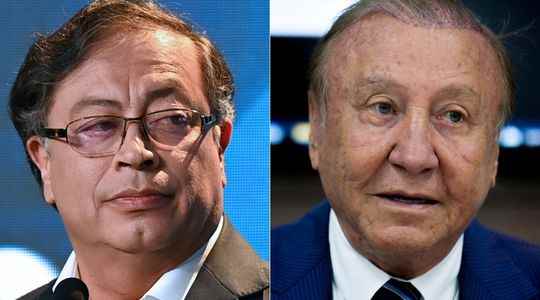The poster for the second round of the Colombian presidential election is not trivial: two anti-system candidates will compete for first place at the polls on Sunday, June 19. Gustavo Petro, 62, former deputy and mayor of Bogota, hopes to win the title of first left-wing president of a country that has never experienced alternation. Facing him, the independent businessman, Rodolfo Hernandez, 77, nicknamed the “Little Old Man of TikTok”, for having carried out his entire campaign on the social network. The outsider – who nevertheless occupied the mandate of mayor of Bucaramanga – embarked on the race without a party and without a program. He dreams of creating a surprise against the ex-guerrilla, in a match that promises to be tight.
At the end of a campaign with a detestable atmosphere, the latest polls give the finalists neck and neck. Each candidate relies on different vote pools. Arriving at the top of the first round with 40% of the vote, the leader of the left-wing coalition the Historical Pact is trying to mobilize the abstainers, the majority in disadvantaged areas and among young people. It should be noted that on May 29, only 55% of the 39 million voters went to the polls. For his part, Rodolfo Hernandez, the Colombian Trump, should recover the votes of the traditional right, beaten in the first round.
Whether economic or social, Colombia will have to face multiple challenges, while the next head of state could suffer from limited room for manoeuvre. Questions are already emerging about their ability to govern in the light of their reciprocal – and mixed – experience as mayors. If Gustavo Petro could be blocked by possibly defiant elites, in particular the army, Rodolfo Hernandez has almost no senator or deputy in Parliament.
In a country of 50 million inhabitants, Petro and Hernandez have multiplied the promises to rally potential voters. Gustavo Petro prefers to present his program as “progressive” rather than “leftist”, aware of the rejection that the term can cause in a country martyred by six decades of conflict with various guerrillas. He said he was in favor of “life” and announced that he wanted to strengthen the state, with more taxes for the rich. His opponent has put forward a catalog of mainly symbolic – and sometimes surprising – measures ranging from the abolition of official cars for parliamentarians to the legalization of marijuana.
A campaign that takes place “between the barricades”
This election is taking place in a Latin American state plagued by drug trafficking and violence. A total of five presidential candidates have been killed since 1948. Conservative incumbent President Ivan Duque’s four years in office were marred by the pandemic, a severe recession and massive anti-government protests that were harshly suppressed by the police. Added to this is an increase in the violence of the many armed groups that rage in the countryside and compete for control of drug trafficking, the country being the largest exporter of cocaine in the world.
The violence did not subside during the presidential campaign, which takes place “between the barricades”, continues El País America. In some parts of the country, teams of presidential candidates cannot broadcast propaganda at the risk of being assassinated. Despite the political reconversion of the main leaders of the FARC guerrillas, after the peace agreements signed in 2016, part of the Colombian territory still escapes state control, falling into the hands of the ELN (rival group of the FARC) or other armed groups, says El País America.
The close vote could give rise to tensions at the time of the count. In an interview with the Spanish newspaper El País on June 18, the candidate for the vice-presidency of Colombia, Francia Márquez, fears, like Gustavo Petro, that there will be fraud this Sunday, but tries to lower the tension: “We are not going to lead this people to an unsustainable social explosion.” It must be said that this campaign was played at loggerheads and was marked by repeated attacks from the two adversaries.
Last episode of this campaign made of accusations and manipulations: the Colombian press revealed last Friday a video of a private party and rather undressed in the presence of the candidate Rodolfo Hernandez. This war also affects the political debate, since the independent candidate refused to participate in a debate with his rival despite a recent court decision to that effect. “As soon as the verdict is known at the polls and there is a new president, it will be necessary to begin to repair the broken mirror of democracy in Colombia. A mirror blackened by an unpresentable electoral campaign that will have to be put in the drawer of oblivion”, tackles an editorialist of the newspaper El País.
